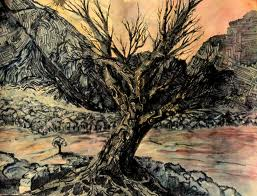As strange as things are in the world things are going to get stranger. Prepare for an assault of books and movies about the end of the world and the terrible things that will happen. Eschatology is words about the end of the world and “Apocalypse” is considered by many to be the same word, or a synonym. Over the years it has become that but the meaning of the word “apocalypse” is revelation. The last book of the Bible is, in Greek, the Apocalypse, It is revealing things that are hidden. It is pealing back what we think is history and showing us the reality behind it all and that reality is God in Christ reconciling the world.
There is apocalyptic and eschatological stuff going on in the Old Testament too but everyone gets all worked up over the last book of the Bible. Zechariah is a book that tells what God is going to do in the history of Israel and the church. Here is beautiful explanation of how one man sees what Zechariah chapter one is saying. His name was Charles Spurgeon.
Zechariah 1:7 -9
On the twenty-fourth day of the eleventh month, which is the month Shebat, in the second year of Darius, the word of the Lord came to Zechariah the son of Berechiah, the son of Iddo the prophet: 8 I saw by night, and behold, a man riding on a red horse, and it stood among the myrtle trees in the hollow; and behind him were horses: red, sorrel, and white. 9 Then I said, “My lord, what are these?” So the angel who talked with me said to me, “I will show you what they are.”
Spurgeon writes,
The vision in this chapter describes the condition of Israel in Zechariah’s day; but being interpreted in its aspect towards us, it describes the Church of God as we find it now in the world. The Church is compared to a myrtle grove flourishing in a valley. It is hidden, unobserved, secreted; courting no honour and attracting no observation from the careless gazer. The Church, like her head, has a glory, but it is concealed from carnal eyes, for the time of her breaking forth in all her splendour is not yet come. The idea of tranquil security is also suggested to us: for the myrtle grove in the valley is still and calm, while the storm sweeps over the mountain summits. Tempests spend their force upon the craggy peaks of the Alps, but down yonder where flows the stream which maketh glad the city of our God, the myrtles flourish by the still waters, all unshaken by the impetuous wind. How great is the inward tranquility of God’s Church! Even when opposed and persecuted, she has a peace which the world gives not, and which, therefore, it cannot take away: the peace of God which passeth all understanding keeps the hearts and minds of God’s people. Does not the metaphor forcibly picture the peaceful, perpetual growth of the saints? The myrtle sheds not her leaves, she is always green; and the Church in her worst time still hath a blessed verdure of grace about her; nay, she has sometimes exhibited most verdure when her winter has been sharpest. She has prospered most when her adversities have been most severe.



Pastor,
Isn’t it ironic that the church grows ever stronger in the midst of persecutions etc. A Kind of lesson from nature as well.
A hot house plant that has been nurtured and coddled all it’s life can do little when exposed to the winds and storms outside it’s place of relative safety but the tree that bears the brunt of storms is unmoveable. The church down through the centuries has had it’s days of persecutions and trials but it has quietly prevailed not unlike it will in this time of terror at the hands of militants. Even So come Lord Jesus!
This was a very comforting post, Pastor thank you for it.